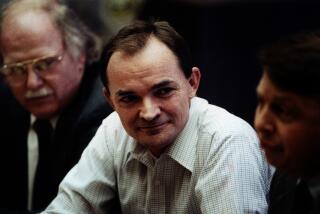Accused Slayer of 16 Declines to Take Stand; Defense Rests in Trial
- Share via
After one last, futile effort to persuade a judge to restrict cross-examination, lawyers for Randy Steven Kraft on Tuesday decided not to place their client on the stand to testify in his own behalf and instead rested their defense at his murder trial.
The announcement by Kraft’s attorney, C. Thomas McDonald, was a surprise and a disappointment for spectators in a packed Santa Ana courtroom, and added to the bitterness of some friends and relatives of the victims that Kraft is charged with killing.
“You bet I’m angry,” said a shaken Rodger DeVaul, whose 20-year-old son, Rodger Jr., was found slain in 1983. “Even if he got up on the witness stand and lied, the prosecutor might have gotten something out of him, so that we might have learned something about what happened. Now we will never know.”
On Trial Since July
Kraft, 44, a Long Beach computer consultant, has been on trial for murder since last July in the deaths of 16 young men between the ages of 18 and 25 in Orange County. If Kraft is convicted, prosecutors have told the court they may present evidence suggesting that he killed as many as 29 other young men in California, Oregon and Michigan. If convicted, Kraft faces the death penalty.
Kraft’s lawyers told Judge Donald A. McCartin last week that their client wanted to testify about five of the 16 murders with which he is charged, but only if the judge would prohibit Deputy Dist. Atty. Bryan F. Brown from asking any questions about the other 11. The judge refused to make any rulings until after he heard Kraft’s testimony on direct examination by the defense lawyers.
The courtroom has been two-thirds empty on most days since testimony began in September. But on Tuesday, after word spread that the defense was on the verge of resting its case, the courtroom was crowded and the usual number of news media representatives quadrupled.
“Mr. Kraft definitely wanted to defend himself,” McDonald said later, “but the judge’s ruling precluded that.”
The defense argued that Kraft, under the U.S. Constitution, has a right not to answer prosecutors’ questions concerning the 11 murders he chose not to testify about. But prosecutor Brown claimed that the 16 murders are linked by Kraft’s method of operation. If would be impossible for Kraft to discuss five murders, the prosecution contended, without touching on circumstances involving the other deaths.
Dead Marine in Car
Kraft was arrested May 14, 1983, when two California Highway Patrol officers on the San Diego Freeway in Mission Viejo found a dead Marine in his car.
Kraft’s decision not to testify has left jurors with no explanation of the circumstances of the Marine’s death. Nor has the defense offered much explanation for pictures of some of the victims--in lewd poses, and appearing dead or unconscious--found in Kraft’s car and at his house.
Closing arguments, expected to last two days, are scheduled to begin the week of April 17.
More to Read
Sign up for Essential California
The most important California stories and recommendations in your inbox every morning.
You may occasionally receive promotional content from the Los Angeles Times.













![Vista, California-Apri 2, 2025-Hours after undergoing dental surgery a 9-year-old girl was found unresponsive in her home, officials are investigating what caused her death. On March 18, Silvanna Moreno was placed under anesthesia for a dental surgery at Dreamtime Dentistry, a dental facility that "strive[s] to be the premier office for sedation dentistry in Vitsa, CA. (Google Maps)](https://ca-times.brightspotcdn.com/dims4/default/07a58b2/2147483647/strip/true/crop/2016x1344+29+0/resize/840x560!/quality/75/?url=https%3A%2F%2Fcalifornia-times-brightspot.s3.amazonaws.com%2F78%2Ffd%2F9bbf9b62489fa209f9c67df2e472%2Fla-me-dreamtime-dentist-01.jpg)